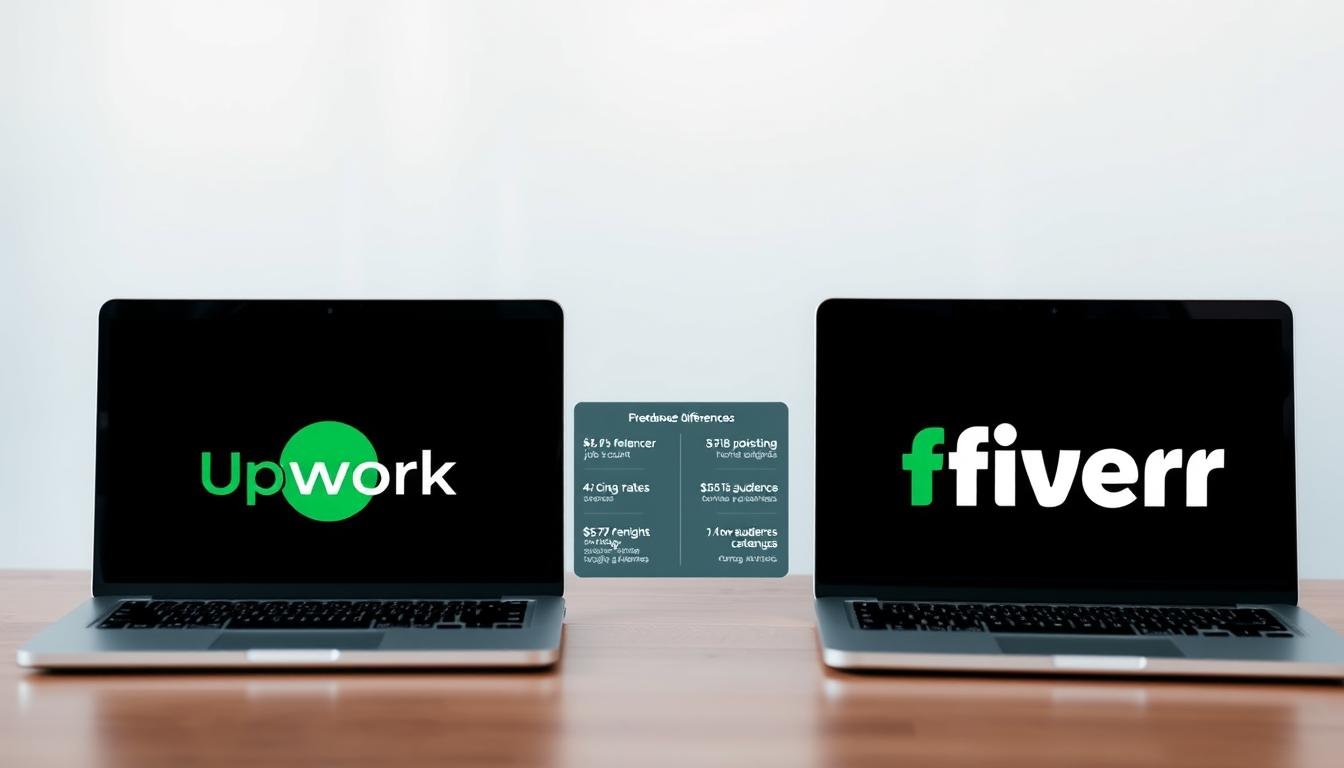Upwork vs. Fiverr: Which Platform Pays More for Beginners?
As the freelance economy continues to thrive, platforms like Upwork and Fiverr have become go-to destinations for freelancers seeking work opportunities.
With more and more individuals turning to freelance work, choosing the right platform can significantly impact your earning potential and career trajectory.
As a beginner, you’re likely wondering which platform is best suited for your skills and financial goals. This article will provide a comprehensive comparison of Upwork and Fiverr, examining their fee structures, client base, and the types of services they offer.
Key Takeaways
- Understand the fundamental differences between Upwork and Fiverr
- Learn which platform offers better earning opportunities for new freelancers
- Discover the types of clients you’ll encounter on each platform
- Find out which platform aligns better with your skills and financial goals
- Get insights into the fee structures of both platforms
The Rise of Freelance Platforms in 2023
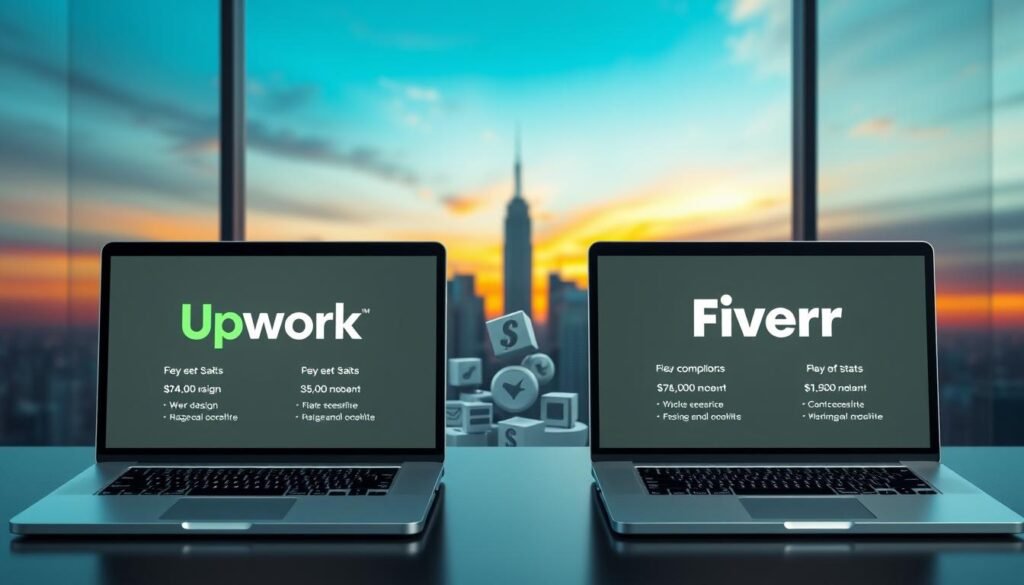
As we navigate through 2023, the rise of freelance platforms continues to reshape the modern work landscape. The freelance industry is increasingly growing, offering benefits for small and medium business owners and providing freedom for freelancers to dive into their passion.
The Growing Trend of Remote Work
The shift towards remote work has been a significant driver in the growth of freelance platforms. With more businesses embracing flexible work arrangements, the demand for freelancers has increased. This trend is expected to continue, with more professionals turning to freelancing as a viable career option.
Why Beginners Are Turning to Freelancing
Several factors are driving beginners to explore freelancing as a career path. Some of the key reasons include:
- Economic uncertainty and layoffs have pushed many professionals to explore freelancing as a supplementary or primary income source.
- Beginners are attracted to the low barriers to entry on platforms like Upwork and Fiverr, which require minimal upfront investment.
- The flexibility to work around existing commitments makes freelancing particularly appealing to students, parents, and career-changers.
- Many beginners view freelancing as a way to build portfolios and gain practical experience that traditional entry-level positions might not offer.
- The ability to scale income based on availability and skill development provides a growth path that many traditional jobs lack.
By offering a platform for freelancers to showcase their skills and connect with potential clients, Upwork and Fiverr are at the forefront of this trend. As the freelance industry continues to evolve, it’s likely that these platforms will play an increasingly important role in shaping the future of work.
Upwork vs. Fiverr: Platform Basics
Understanding the basics of Upwork and Fiverr is crucial for beginners looking to dive into freelancing. Both platforms have distinct features that cater to different needs and preferences.
Upwork: The Professional Marketplace
Upwork is a comprehensive freelance platform that connects professionals with clients across various industries. It offers a wide range of categories, from web development and design to writing and marketing. Clients can post job descriptions, and freelancers bid on projects that match their skills. This platform is ideal for those looking for long-term projects or high-paying gigs. Upwork’s structure allows freelancers to showcase their portfolios, making it easier for potential clients to assess their capabilities.
The platform’s professional nature means that it attracts a significant number of businesses and entrepreneurs looking for skilled workers. As a result, Upwork has become a go-to marketplace for freelancers seeking substantial projects. With its robust system for tracking work hours and payments, Upwork provides a secure environment for both clients and freelancers.
Fiverr: The Gig Economy Giant
Fiverr started as a platform where clients could hire freelancers for projects priced at just $5. Since its inception in 2010, it has evolved into a gig economy giant, allowing freelancers to offer a diverse range of services from digital marketing to graphic design. Fiverr’s model is based on “gigs,” where freelancers create pre-packaged service offerings that clients can purchase instantly.
- Fiverr pioneered the “gig economy” model, enabling freelancers to define their services, pricing, and delivery times.
- The platform handles approximately 1 million transactions monthly and attracts nearly 35 million visitors per month.
- Fiverr’s straightforward purchasing process makes it particularly accessible to small businesses and individuals seeking quick, defined services.
Fiverr’s evolution has seen it accommodate professional-level pricing, making it a viable option for freelancers looking to offer more than just low-cost services. The platform’s focus on sellers (freelancers) defining their services empowers them to control their pricing and delivery, creating a flexible and competitive marketplace.
How Each Platform’s Business Model Works
Freelancers need to grasp how Upwork and Fiverr work to make informed decisions about their careers. Both platforms offer unique opportunities, but their underlying business models shape how freelancers offer their services.
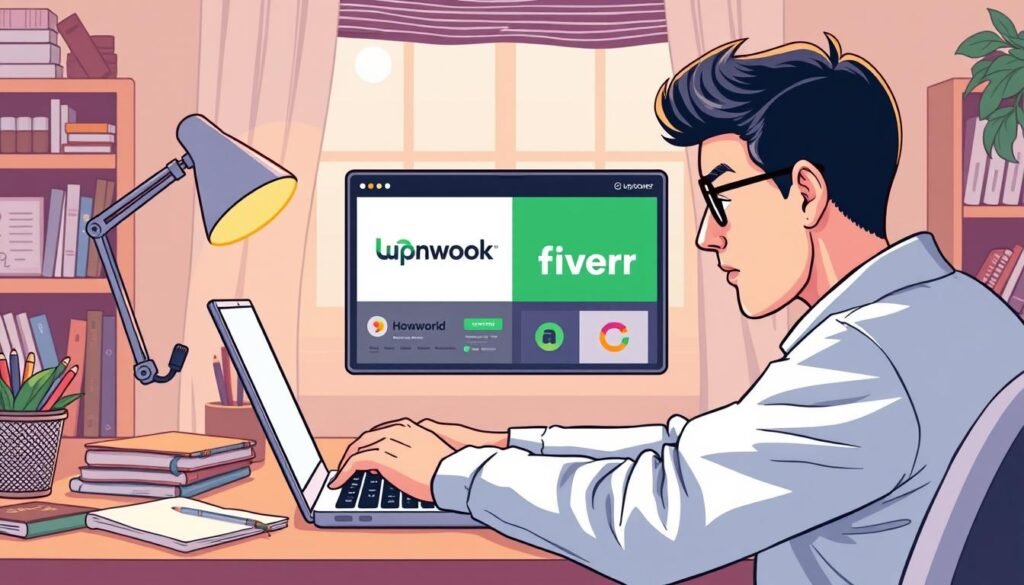
Upwork’s Bidding System Explained
Upwork operates on a bidding system where freelancers compete for projects by submitting proposals. This model allows clients to choose from a pool of candidates based on their profiles, portfolios, and bid amounts. To succeed on Upwork, freelancers must craft compelling proposals that highlight their skills and experience.
The bidding system can be competitive, but it also allows freelancers to be selective about the projects they pursue. By understanding the system, freelancers can position themselves for success and build a strong reputation on the platform.
Fiverr’s Gig-Based Approach
Fiverr’s business model revolves around gigs, where freelancers create pre-defined service packages that clients (or buyers) can browse and purchase. This approach eliminates the need for lengthy negotiations, as freelancers specify exactly what they’ll deliver, at what price, and in what timeframe.
- Fiverr’s gig-based system flips the traditional hiring model by having freelancers create pre-defined service packages.
- Freelancers create “gigs” that specify exactly what they’ll deliver, at what price, and in what timeframe.
- Each gig typically offers three tiers (Basic, Standard, Premium) with increasing deliverables and corresponding price points.
- This product-oriented approach means clients come to freelancers rather than the other way around.
- The system favors freelancers who can clearly package their services and market them effectively.
Setting Up Your Freelancer Profile
A well-crafted profile can make all the difference in your freelancing journey on Upwork and Fiverr. Your profile serves as a potential client’s first impression of you, making it a crucial element in securing projects. Both platforms, though different in their approach, require a thoughtful and professional profile setup.
Creating an Effective Upwork Profile
On Upwork, your profile is a comprehensive showcase of your professional background, skills, and experience. To create an effective Upwork profile, focus on highlighting your professional achievements and the services you offer. Your profile should include a clear, concise headline, a detailed description of your services, and examples of your work. Upwork’s platform emphasizes the importance of a well-written profile in attracting clients.
Key elements of an effective Upwork profile include:
- A professional profile picture and header image
- A compelling headline that clearly states your profession or service
- A detailed and engaging description that outlines your skills, experience, and the services you provide
- Portfolio samples that demonstrate your work quality
As noted by successful freelancers, “A complete and professional profile can significantly increase your chances of being noticed by potential clients.” A well-structured profile not only enhances visibility but also builds credibility.
“A professional profile is not just about listing your skills; it’s about showcasing your story and how you can solve clients’ problems.”
Designing a Standout Fiverr Profile
Fiverr, on the other hand, is more gig-oriented, meaning your profile works closely with your gigs to attract buyers. When designing a Fiverr profile, it’s essential to create a “gig” that effectively communicates the service you offer. This includes a clear title, a detailed description of your service, and relevant images or videos that showcase your work.
For a standout Fiverr profile:
| Profile Element | Description | Importance |
|---|---|---|
| Gig Title | Clearly states the service you offer, starting with “I will” | High |
| Gig Description | Detailed explanation of your service, including what clients can expect | High |
| Gig Images/Videos | Visual representations of your service or work samples | Medium |
| Seller Level | Indicates your level of experience and credibility on Fiverr | High |

Creating a compelling Fiverr profile requires not just listing your services but also showcasing your personality and style, as buyers often choose freelancers based on personal connection. Ensuring your profile is visually appealing and effectively communicates your expertise is key to attracting buyers.
Fee Structures and Platform Costs
Both Upwork and Fiverr have distinct fee structures that freelancers need to understand to optimize their financial gains. When comparing these platforms, it’s essential to consider how their fee models impact your earnings.
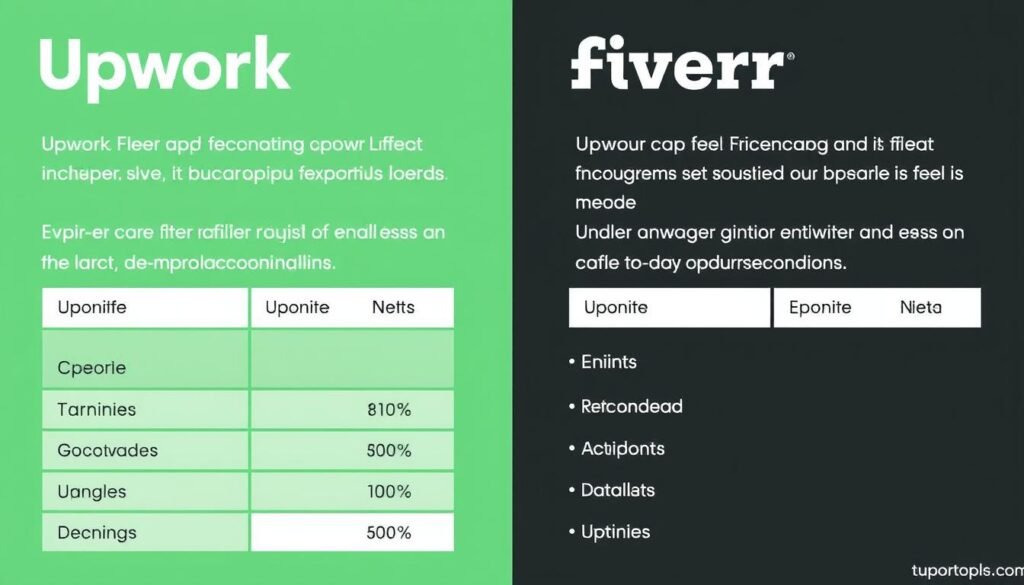
Upwork’s Sliding Fee Scale
Upwork employs a sliding fee scale that adjusts based on the amount you earn from a specific client. This means that as you earn more from a client, the percentage that Upwork takes decreases. For beginners, understanding this structure is crucial as it can significantly affect your take-home pay.
The sliding scale starts at 5% for earnings up to $500 with a client, then decreases to 3% for earnings between $500.01 and $10,000, and further reduces to 1% for earnings above $10,000 with the same client. This structure incentivizes long-term relationships between freelancers and clients.
Fiverr’s 20% Commission Model
Fiverr, on the other hand, maintains a straightforward 20% commission on all earnings, regardless of the gig price or your history with the client. This flat fee structure means that both beginners and experienced sellers are treated equally, with no opportunity to reduce fees through client loyalty.
For sellers, Fiverr’s 20% commission is a significant consideration when pricing services. Additionally, buyers are charged a 5.5% service fee on the purchase amount, with an additional $2 small order fee for purchases under $50. This fee structure can impact how you price your services to ensure profitability.
Unlike Upwork, Fiverr does not have ongoing costs for maintaining your account or bidding on projects—you only pay when you earn. When calculating your pricing strategy on Fiverr, you’ll need to factor in this consistent 20% commission to ensure your rates remain profitable.
Payment Methods and Withdrawal Processes
The payment process can make or break a freelancer’s experience on platforms like Upwork and Fiverr. Understanding how these platforms handle payments and withdrawals is crucial for managing your finances effectively.
Upwork’s Payment Protection and Options
Upwork offers a robust payment protection system that ensures freelancers get paid for their work. Clients fund projects through various payment methods, including credit cards, PayPal, and bank transfers. Upwork holds the funds until the client approves the work, ensuring that freelancers are protected. Once approved, freelancers can withdraw their earnings through methods like direct deposit, PayPal, or wire transfer. Upwork’s system is designed to provide a secure payment process for both parties.
The fee structure on Upwork is based on a sliding scale, where the commission fee decreases as you earn more from a client. This encourages long-term relationships between freelancers and clients. For instance, for the first \$500 earned from a client, the fee is 5%. This fee structure is an essential aspect of Upwork’s overall system.
| Earnings from a Client | Upwork Fee |
|---|---|
| First \$500 | 5% |
| \$500.01 to \$10,000 | 4% |
| Above \$10,000 | 3% |
Fiverr’s Payment System and Currencies
Fiverr operates on a pay-per-order basis, where clients pay for each gig upfront. This system provides security for freelancers, as they know exactly how much they’ll earn for each project. After completing a gig and receiving client approval, the funds are held for a time period—14 days for new sellers and 7 days for top-rated sellers—before they can be withdrawn.
Fiverr offers multiple withdrawal options, including PayPal, Fiverr Revenue Card, and bank transfers for US sellers. Notably, Fiverr allows withdrawals in several currencies, including USD, EUR, GBP, CAD, AUD, and ILS. However, currency conversion rates may apply if you’re not withdrawing in USD. The gig-based system on Fiverr makes financial planning straightforward for freelancers.
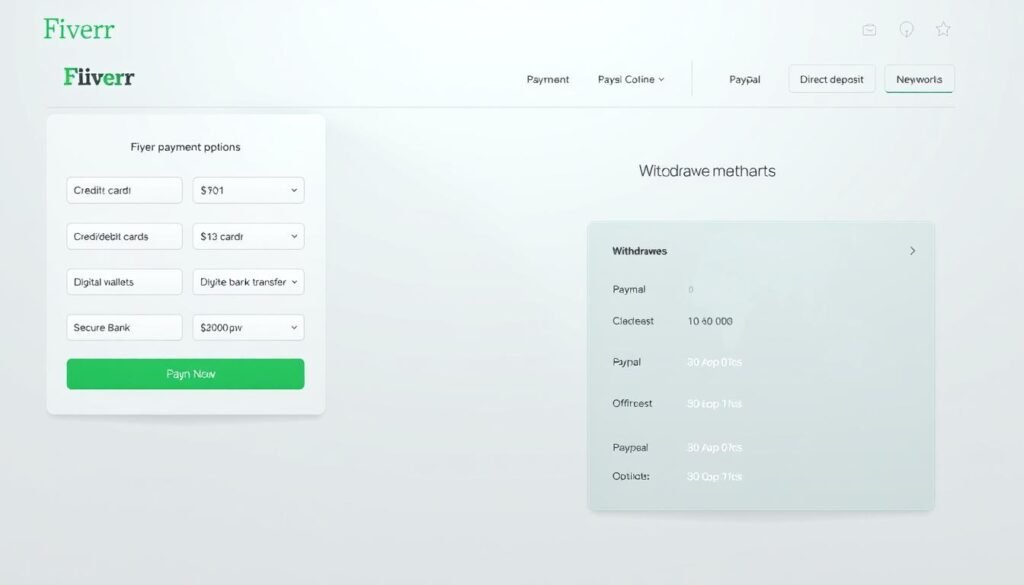
Fiverr’s payment system is designed to be straightforward and secure, allowing you to focus on delivering high-quality work. By understanding how Fiverr’s payment process works, you can better manage your payment expectations and plan your finances accordingly.
Types of Projects and Client Demographics
When choosing between Upwork and Fiverr, understanding the types of projects and client demographics is crucial for freelancers. Both platforms cater to different needs and offer unique opportunities.
Upwork: Long-term Projects and Corporate Clients
Upwork is known for hosting long-term projects that often involve complex tasks and collaborations. This platform attracts a significant number of corporate clients who are looking for professionals with specialized skills. As a result, Upwork’s project base includes a wide range of categories, from software development and IT to content creation and marketing. Freelancers on Upwork typically engage in projects that require ongoing work, sometimes lasting several months or even years. The clients on Upwork are often established businesses or large enterprises that value reliability and high-quality work.

Fiverr: Quick Gigs and Small Business Clients
Fiverr, on the other hand, is characterized by its gig-based system, where freelancers offer specific services starting at $5 per task. This platform is particularly popular among small businesses, startups, and entrepreneurs who need quick, affordable solutions. Fiverr’s clients typically have limited budgets and seek straightforward, well-defined services such as logo design, content writing, or voice-overs. The gig format allows freelancers to clearly define their offerings and manage client expectations effectively. Fiverr’s client base prefers simplicity and efficiency, making it an ideal platform for beginners who can deliver standardized services.
The clients on Fiverr are generally budget-conscious and prioritize speed and affordability. They often work on limited resources and prefer minimal back-and-forth, which makes Fiverr a great starting point for new freelancers. By understanding the business needs and project types on Fiverr, freelancers can tailor their gig offerings to meet the demands of their clients, thus enhancing their success on the platform.
Competition and Standing Out as a Beginner
For new freelancers, differentiating themselves on platforms like Upwork and Fiverr is crucial for success. As you start your freelancing journey, understanding the competitive landscape of these platforms is essential to carve out your niche and attract clients.
Navigating Upwork’s Competitive Landscape
Upwork’s vast pool of freelancers means that competition can be fierce, especially for beginners. To stand out, you need to create a professional profile that showcases your skills and experience. Choosing the right categories and using relevant keywords in your profile and proposals can significantly improve your visibility to potential clients. Moreover, being competitive with your pricing and delivering high-quality work can help you secure positive reviews, which are crucial for attracting more clients.
With many freelancers competing for projects, it’s essential to be proactive in marketing yourself and your services. This includes being responsive to client inquiries and consistently delivering high-quality work to build a strong reputation.
Breaking Through on Fiverr’s Marketplace
Fiverr’s marketplace is highly competitive, with thousands of gig offerings. To succeed as a seller on Fiverr, you must strategically position your gigs to gain visibility. This involves using SEO-optimized gig titles, relevant tags, and compelling thumbnails. The platform’s search algorithm prioritizes factors like completion rate, response time, and reviews, making your initial performance crucial. New sellers often face the “chicken and egg” problem of needing reviews to get orders but needing orders to get reviews. To overcome this, consider offering competitive pricing and unique services that clearly demonstrate your value to potential clients.

As you navigate Fiverr’s competitive environment, maintaining a high level of service quality and ensuring timely delivery can help you build a strong profile and attract more clients. For those who achieve a reliable work history and solid portfolio, applying for Fiverr Pro can be a significant step forward, as it involves a series of vetting processes that can further enhance your credibility.
Upwork vs. Fiverr: Which Platform Pays More for Beginners?
The earning potential for beginners on Upwork and Fiverr varies, influenced by several factors including project type and client base. When deciding between these two platforms, it’s essential to understand how each caters to new freelancers and the opportunities they offer.
Beginner Earning Potential on Upwork
On Upwork, beginners can expect a competitive environment where clients seek professionals for a wide range of projects. To attract clients, new freelancers often need to bid competitively, sometimes at lower rates to build their portfolio and gain initial reviews. Upwork’s fee structure, which includes a sliding scale based on lifetime billings with a client, can also impact earnings.
Key points to consider for Upwork include:
- The need to bid on projects, which can be time-consuming.
- The potential for long-term contracts that can stabilize income.
- A diverse pool of projects, including larger, more complex work.
Beginner Earning Potential on Fiverr
Fiverr offers a different model, where freelancers create “gigs” that clients can purchase. For beginners, Fiverr can be an attractive option, especially for those offering services that can be delivered in a straightforward manner, such as digital art or voiceovers. The platform’s tiered gig structure allows sellers to upsell services, potentially increasing earnings per project.
- Lower barriers to entry, with gigs starting at $5.
- The potential for passive income once gigs are established.
- A flat 20% commission on earnings, simplifying the fee structure.
In conclusion, while both platforms have their merits, the choice between Upwork and Fiverr for beginners depends on the type of services offered and the preferred working style. For those offering quick, one-off services, Fiverr might be more lucrative. In contrast, Upwork could be better suited for freelancers looking for longer-term projects or more complex work.
Building Your Reputation and Advancing
As you establish yourself on Upwork or Fiverr, building a strong reputation is crucial for long-term success. A reputable profile can significantly enhance your credibility and attract high-paying clients.
Upwork’s Top Rated and Rising Talent Programs
Upwork offers programs like Top Rated and Rising Talent to recognize high-performing freelancers. These programs are designed to reward freelancers who consistently deliver high-quality work and provide excellent client service. To become Top Rated, you must meet specific criteria, including a high job success score, excellent feedback, and timely support. Being part of these programs can increase your visibility and earning potential on the platform.
Fiverr’s Seller Levels and Pro Verification
Fiverr has a tiered system called Seller Levels, which includes New Seller, Level One, Level Two, and Top Rated Seller. Advancing through these levels requires meeting specific performance metrics, such as order completion rate, response time, and client satisfaction. For instance, achieving Level One requires completing 10 orders and maintaining active status for 60 days. Higher levels demand even more stringent performance standards. Fiverr Pro is a separate verification program for elite freelancers, requiring an application and portfolio review. Pro sellers are known for their exceptional skills and are often sought after by clients. You can learn more about other opportunities for freelancers and expand your experience.
The benefits of advancing through Fiverr’s Seller Levels include additional gig offerings, more custom offers, and priority support. At the highest level, you receive VIP customer service, further enhancing your ability to attract and retain clients. By focusing on client satisfaction and consistently delivering high-quality work, you can advance through these levels and increase your earning potential on Fiverr.
Workload Management and Flexibility
Effective workload management is key to succeeding as a freelancer on platforms such as Upwork and Fiverr. As a freelancer, you need to balance multiple projects, meet deadlines, and maintain a healthy work-life balance.
Setting Boundaries on Upwork
On Upwork, setting boundaries involves being selective with the projects you bid on and ensuring you have enough time to complete them. By doing so, you can avoid overcommitting and maintain high-quality work. It’s essential to communicate effectively with your client about your availability and work schedule.
Managing Order Queues on Fiverr
Fiverr’s gig system requires proactive workload management. You can limit the number of orders in your queue to prevent over-ordering. For instance, if you accept three orders at once, you won’t receive new orders until you’ve completed the existing ones. Fiverr’s features help you manage your workload:
- Limit the number of orders you can receive simultaneously using the order queue system.
- Set custom delivery times for each gig package to manage client expectations.
- Use the “Out of Office” mode to pause your gigs when you’re unavailable.
- Extend delivery times or offer cancellations if needed, with client approval.
By utilizing these features, you can maintain flexibility and efficiently manage your workload as a freelancer on Fiverr.
Mobile Apps and Accessibility
The ability to work on-the-go is a significant advantage for freelancers, and mobile apps provide this flexibility. Both Upwork and Fiverr offer mobile apps for iOS and Android devices, enabling you to manage your work efficiently.
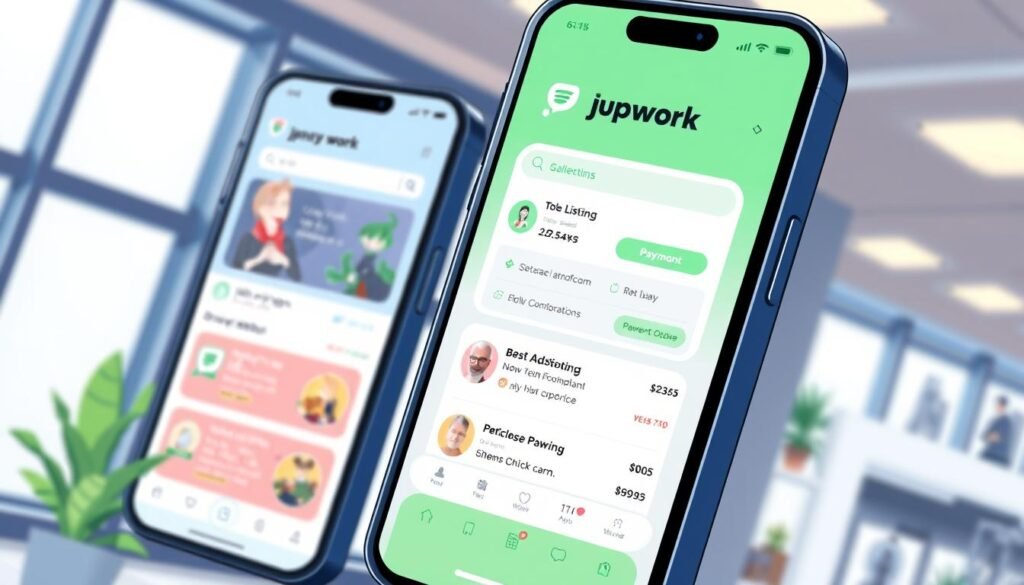
Upwork’s Mobile Experience
Upwork’s mobile app allows you to stay connected with clients and manage your projects on the go. With a user rating of 4.6 on the App Store and 4.0 on Google Play Store, it is well-regarded by its users. The app enables you to communicate with clients, submit proposals, and track your work.
Fiverr’s App Functionality
Fiverr’s mobile app offers a streamlined interface for managing your gigs, communicating with buyers, and receiving order notifications. With a high rating of 4.9 on the App Store, it is particularly praised by iOS users. The app allows you to create and edit gigs, though the desktop version is often preferred for initial setup. Real-time notifications help you maintain quick response times, boosting your seller ranking.
By utilizing these mobile apps, you can efficiently manage your work, stay connected with clients, and increase your productivity as a freelancer.
Dispute Resolution and Payment Protection
Freelancers must be aware of the dispute resolution processes on Upwork and Fiverr to protect their payments. Both platforms have mechanisms in place to handle disputes, ensuring a fair experience for clients and freelancers.
Upwork’s Conflict Resolution
Upwork’s dispute resolution process is designed to be comprehensive, allowing for various methods to resolve conflicts. It begins with a messaging system that enables clients and freelancers to communicate directly and resolve issues. If unresolved, the dispute can be escalated to Upwork’s customer support team, which reviews the case and makes a decision.
A key feature of Upwork’s system is its flexibility, allowing for nuanced resolutions based on the specifics of each case. This can include partial refunds or other adjustments as necessary.
| Resolution Method | Description |
|---|---|
| Direct Communication | Client and freelancer resolve issues through messaging |
| Customer Support | Upwork’s team reviews and resolves disputes |
Fiverr’s Dispute Handling
Fiverr’s approach to dispute resolution is more straightforward, utilizing an Order Resolution Center for initial dispute handling. This system allows buyers and sellers to communicate and potentially resolve issues without external intervention.
If a resolution isn’t reached, Fiverr’s customer support team reviews the case, making a final decision that is typically binding. Fiverr’s process is designed to be efficient, with a clear structure for resolving disputes.
“On Fiverr, someone at Fiverr will look over your dispute and decide whether or not you deserve a partial or full refund.”
Fiverr’s payment protection includes a 14-day clearing period, allowing buyers time to assess the quality of services before payments are released.
Alternative Freelance Platforms Worth Considering

Beyond Upwork and Fiverr, numerous alternative freelance platforms cater to various needs and skills. These platforms offer a range of opportunities for freelancers to find work that suits their expertise.
General Freelance Marketplaces
Several general freelance marketplaces are worth considering. FlexJobs is known for its hand-screened job postings, ensuring more qualified applicants. Virtual Vocation focuses on remote jobs, while PeoplePerHour connects small businesses with freelancers globally. Guru and We Work Remotely are other notable platforms that help clients and freelancers connect.
For instance, you can explore more ideas on how to boost your income through various side hustles in this article.
Niche-Specific Platforms
Niche-specific platforms often provide better opportunities for beginners with specialized skills. For example, 99designs and Designhill are ideal for design-focused freelancers, offering contest-based work to build portfolios. Writers and content creators can explore Contently, Scripted, or TextBroker. Technical freelancers might find higher-paying opportunities on Toptal, Arc, or GitHub Jobs.
These niche platforms typically have higher barriers to entry but offer better rates and more serious clients once you’re accepted.
Conclusion
The decision between Upwork and Fiverr hinges on your skills, work style, and financial goals as a freelancer. Both platforms offer unique opportunities, but understanding their differences is key to maximizing your earnings.
For beginners, Upwork typically offers higher earning potential for those willing to invest time in the bidding process and client relationship management. On the other hand, Fiverr provides a more accessible entry point with faster initial earnings, albeit at lower rates.
Many successful freelancers eventually establish profiles on both platforms, leveraging each for different types of projects and income streams. Regardless of which platform you choose, success as a beginner freelancer ultimately depends on delivering quality work, maintaining professional communication, and strategically building your reputation over time in the business categories you’re operating in.
By understanding the strengths and weaknesses of each platform and aligning them with your business goals, you can make an informed decision that sets you up for success in the freelancing world.
FAQ
What are the key differences between Upwork and Fiverr’s fee structures?
How do I get started with offering services on these freelance platforms?
Can I work on long-term projects on Fiverr, or is it limited to one-time gigs?
How do Upwork and Fiverr protect freelancers from non-payment or disputes?
Are there any additional costs or fees associated with using these platforms?
Can I use both Upwork and Fiverr simultaneously to find work?
editor's pick
latest video
news via inbox
Nulla turp dis cursus. Integer liberos euismod pretium faucibua

